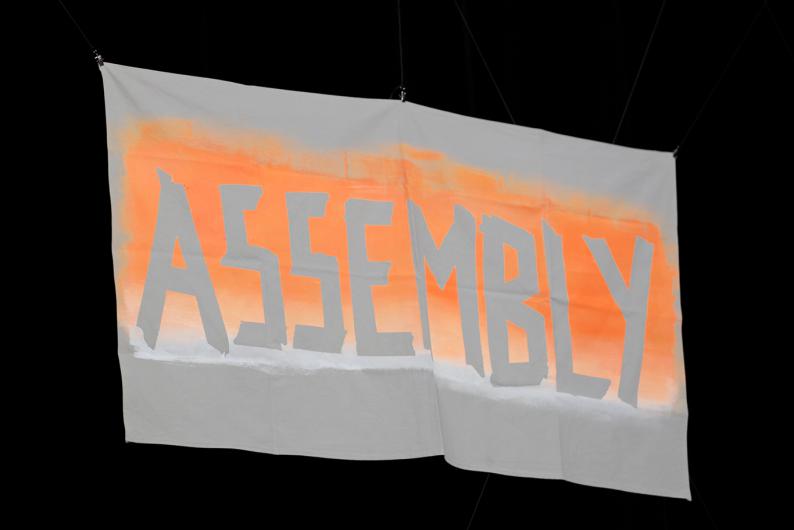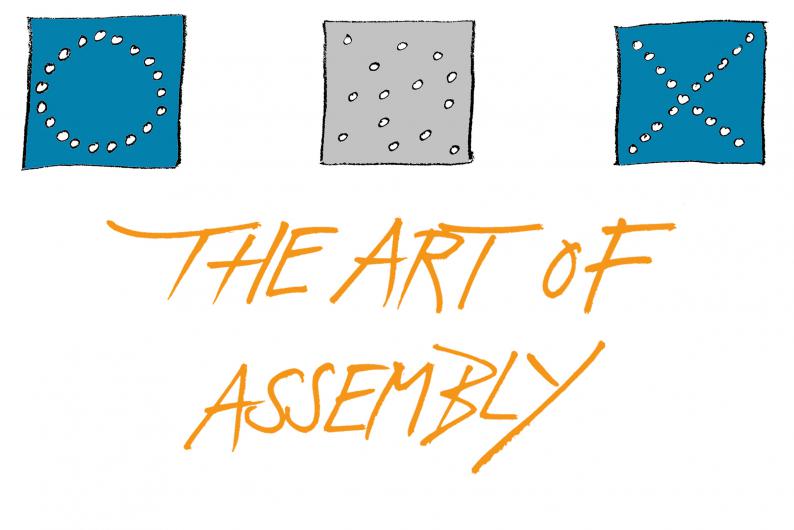The Art of Assembly XII – PARLIAMENTS OF THINGS AND BEINGS
CANCELED. The event cannot take place for health reasons. We plan to show this event on a later date.
The question of who or what has to be represented draws wider circles than most assemblies with their focus on humans. In his fundamental critique of modernity, the sociologist of science Bruno Latour sketched out a "parliament of things" as early as 1989, in which people, animals, plants, and objects jointly determine how they even could decide and how they want to live together. Thirty years later, Latour sums up, "The question is no longer to grand rights to non-humans, but to accept to be dependent on them." But it is precisely the anthropocentric medium of theater that finds it difficult to deal with developments that banish humans from the center of thought and feeling: A potted plant on stage does not establish a parliament of things; pigeons as protagonists do not establish posthumanism. In the 12th issue of The Art of Assembly, scholar, and director Frédérique Aït-Touati describes her longtime collaboration with Latour on a "theater of negotiation." The theater group andcompany&Co. praises the intelligence of insects and considers renaming itself to antcompany.
 Visit art-of-assembly.net for videos, podcasts and background info
Visit art-of-assembly.net for videos, podcasts and background info
Gesellschaftsspiele. The Art of Assembly is a series of lectures and conversations on the potential of assemblies in activism, art and politics hosted by Florian Malzacher. Former and future guests include Judith Butler, Jodie Dean, Radha D`Souza, Didier Eribon, Max Haiven, Oliver Marchart, Alia Mossallam, Chantal Mouffe, Sibylle Peters, Milo Rau, Oliver Ressler, Jonas Staal & Dana Yahalomi. The series is produced by brut Wien, in cooperation with Münchner Kammerspiele, Wiener Festwochen and Volksbühne am Rosa-Luxemburg-Platz.
About The Art of Assembly. Lectures, discussions, online platform
Whether in Tunis, Cairo, Madrid, or Lisbon, in Athens, New York, London, or Istanbul, in post-Fukushima Tokyo, in the midst of Niemeyer’s iconic parliamentary architecture in Brasilia, under the umbrellas of Hong Kong, or on the streets of Minneapolis: social and political movements of recent years have often been characterised by their search for alternative forms of gathering, of arguing and making decisions, of negotiating community and society. The potential of these assemblies lies in more than just the demands they put forward; many of them change reality merely by practicing radical models of democracy.
The arts have also shown a renewed interest in concepts of gathering and creating public spheres in which society is not only mirrored but constantly tried out, performed, tested, reimagined, or even reinvented. There are court hearings on artistic freedom, religion, and censorship; tribunals on exploitation and violence; summits on climate change or cultural policy; parliaments allowing those who are usually silenced to speak... Theatre in particular has become a stage for assemblies on the fine line between art and reality, a democratic arena of radical imagination.
But what is the future this concept of gathering has ahead of it after months in a state of emergency that has thrown pretty much all areas of social life out of step? Gesellschaftsspiele: The Art of Assembly brings together protagonists from various fields of art, politics and theory to speculate on the future of assembly in a time of experiencing that nothing is certain – a time in which every form of physical togetherness has become precarious.
Florian Malzacher is a curator, dramaturg and writer. 2013-2017 he was artistic director of Impulse Theater Festival (Cologne, Dusseldorf and Mulheim/Ruhr), and 2006–2012 co-programmer of the multidisciplinary arts festival steirischer herbst (Graz). He (co-)curated e.g. the 4th and 5th International Summer Academy (Mousonturm Frankfurt, 2002 and 2004), “Dictionary of War” (2006/07), “Truth is concrete” (Graz, 2012), “Artist Organisations International” (HAU Berlin, 2015), “Appropriations” (Ethnological Museum Berlin, 2014), “Sense of Possibility” on the occasion of the 100th anniversary of the revolution (St. Petersburg, 2017), “Training for the Future” (Ruhrtriennale 2018/19 with Jonas Staal), “After Supervising the Machinery” (2020). As a dramaturge he worked with artists like Rimini Protokoll (DE), Lola Arias (ARG), Mariano Pensotti (ARG), and Nature Theater of Oklahoma (USA). Florian Malzacher has edited and written numerous essays and books on theatre and performance and on the relationship between art and politics. His latest publications include Gesellschaftsspiele. Politisches Theater heute im Alexander Verlag Berlin. florianmalzacher.tumblr.com
The Art of Assembly is based on
Florian Malzacher. Gesellschaftsspiele. Politisches Theater heute. Berlin: Alexander Verlag, 2020.
Credits
With Didier Eribon Chantal Mouffe, Sibylle Peters, Julia Ramírez-Blanco, Milo Rau, Oliver Ressler, Dana Yahalomi / Public Movement, Jodi Dean, Jonas Staal and many more Curated by Florian Malzacher
The Art of Assembly – Gesellschaftsspiele, a series by Florian Malzacher and brut Wien, in cooperation with Münchner Kammerspiele, Wiener Festwochen, Volksbühne am Rosa-Luxemburg-Platz (Berlin), BIT Teatergarasjen / METEOR 2021 and Goethe Institut
Dates & Tickets
December 2021
Canceled: The event cannot take place for health reasons. We plan to show this event on a later date.
Event recommendations
With Merve Bedir, Benjamin Foerster-Baldenius / raumlabor berlin & Marina Otero Verzier. Hosted by Florian Malzacher
Gesellschaftsspiele – The Art of Assembly XI in cooperation with Goethe-Institut / Performing Architecture
ARCHITECTURES OF HOSPITALITY
With Anna Clara Basilicò / Rise Up For Climate Justice (Venice) & Antonio Negri (Paris) Moderiert von Marco Baravalle
Gesellschaftsspiele: The Art of Assembly X in cooperation with Goethe-Institut / Performing Architecture
THE POLITICS OF MULTITUDE: ASSEMBLY AS STRATEGY
brut all over Vienna
brut nordwest
accessible
Nordwestbahnstraße 8-10, 1200 Vienna
Subway: U1, U2 (Praterstern), U4 (Friedensbrücke), U6 (Dresdnerstraße) Tram: 5 (Nordwestbahnstraße) Bus: 5A (Wasnergasse)
accessible
studio brut
not accessible
Zieglergasse 25, 1070 Wien
Subway: U3 (Zieglergasse), Tram: 49 (Westbahnstraße / Zieglergasse)
not accessible
Bears in the Park Art Place
not accessible
Eyzinggasse 12, 1110 Vienna
U-Bahn: U3 (Gasometer) Bus: 72A (Gasometer), 76A, 76B (Simoningplatz)
not accessible
WUK performing arts
barrierefrei
Währinger Straße 59, 1090 Vienna
Subway: U6 (Währinger Straße / Volksoper), Tram: 40, 41, 42 (Währinger Straße / Volksoper), 5, 33 (Spitalgasse), 37, 38, 40, 41, 42 (Spitalgasse / Währinger Straße)
Der Betrieb
accessible
Vogelweidplatz 13, 1150 Wien
Subway: U6 (Burggasse-Stadthalle) / Bus: 48A (Moeringgasse) / Tram: 9 (Camillo Sitte Gasse)









